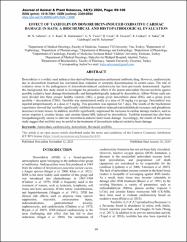| dc.contributor.author | Aldemir, Mehmet Naci | |
| dc.contributor.author | Kara, Ali Veysel | |
| dc.contributor.author | Mammadov, Renad | |
| dc.contributor.author | Yazıcı, Gülce Naz | |
| dc.contributor.author | Çiçek, Betül | |
| dc.contributor.author | Yavuzer, B. | |
| dc.contributor.author | Coşkun, Reşit | |
| dc.contributor.author | Sakin, Abdullah | |
| dc.contributor.author | Gülaboğlu, Mine | |
| dc.contributor.author | Süleyman, Halis | |
| dc.date.accessioned | 2024-02-26T09:15:16Z | |
| dc.date.available | 2024-02-26T09:15:16Z | |
| dc.date.issued | 2024 | en_US |
| dc.identifier.citation | Aldemir, M. N., Kara, A. V., Mammadov, R., Yazıcı, G. N., Çiçek, B., Yavuzer, B. ... Süleyman, H. (2024). Effect of taxifolin on doxorubicin-induced oxidative cardiac damage in rats: A biochemical and histopathological evaluation. Journal of Animal and Plant Sciences, 34(1), 99-106. https://dx.doi.org/10.36899/JAPS.2024.1.0698 | en_US |
| dc.identifier.issn | 1018-7081 | |
| dc.identifier.issn | 2309-8694 | |
| dc.identifier.uri | https://dx.doi.org/10.36899/JAPS.2024.1.0698 | |
| dc.identifier.uri | https://hdl.handle.net/20.500.12511/12313 | |
| dc.description.abstract | Doxorubicin is a widely used anthracycline-derived broad-spectrum antitumoral antibiotic drug. However, cardiotoxicity due to doxorubicin treatment has warranted dose reduction or complete discontinuation in certain cases. The role of oxidative stress in the pathogenesis of doxorubicin-induced cardiotoxicity has been previously demonstrated. Against this background, this study aimed to investigate the protective effect of the potent antioxidant flavone taxifolin against possible oxidative heart damage biochemically and histopathologically induced by doxorubicin. Albino Wistar male rats were divided into three groups: healthy controls (HG), a group given doxorubicin alone (DG), and a group given taxifolin + doxorubicin ( TDG). Taxifolin was administered orally at a dose of 50 mg/kg via gavage. Doxorubicin was injected intraperitoneally at a dose of 5 mg/kg. This procedure was repeated for 7 days. The results of the biochemical experiment showed that taxifolin significantly inhibited doxorubicin-induced malondialdehyde increases and glutathione decreases in heart tissues. In addition, taxifolin significantly suppressed the increases in cardiac damage markers, such as serum troponin I, creatine kinase, and creatine kinase-MB, induced by doxorubicin. Taxifolin treatment has also been histopathologically shown to alleviate doxorubicin-induced heart tissue damage. Accordingly, the results of the present study suggest that taxifolin may be useful in the treatment of doxorubicin-induced oxidative heart damage. | en_US |
| dc.language.iso | eng | en_US |
| dc.publisher | Pakistan Agricultural Scientists Forum | en_US |
| dc.rights | info:eu-repo/semantics/openAccess | en_US |
| dc.rights | Attribution 4.0 International | * |
| dc.rights.uri | https://creativecommons.org/licenses/by/4.0/ | * |
| dc.subject | Antioxidant | en_US |
| dc.subject | Cardiotoxicity | en_US |
| dc.subject | Doxorubicin | en_US |
| dc.subject | Flavonoid | en_US |
| dc.subject | Taxifolin | en_US |
| dc.title | Effect of taxifolin on doxorubicin-induced oxidative cardiac damage in rats: A biochemical and histopathological evaluation | en_US |
| dc.type | article | en_US |
| dc.relation.ispartof | Journal of Animal and Plant Sciences | en_US |
| dc.department | İstanbul Medipol Üniversitesi, Tıp Fakültesi, Dahili Tıp Bilimleri Bölümü, İç Hastalıkları Ana Bilim Dalı | en_US |
| dc.authorid | 0000-0003-2538-8569 | en_US |
| dc.identifier.volume | 34 | en_US |
| dc.identifier.issue | 1 | en_US |
| dc.identifier.startpage | 99 | en_US |
| dc.identifier.endpage | 106 | en_US |
| dc.relation.publicationcategory | Makale - Uluslararası Hakemli Dergi - Kurum Öğretim Elemanı | en_US |
| dc.identifier.doi | 10.36899/JAPS.2024.1.0698 | en_US |
| dc.institutionauthor | Sakin, Abdullah | |
| dc.identifier.wosquality | Q3 | en_US |
| dc.identifier.wos | 001149100300008 | en_US |
| dc.identifier.scopus | 2-s2.0-85185293292 | en_US |
| dc.identifier.scopusquality | Q4 | en_US |



















